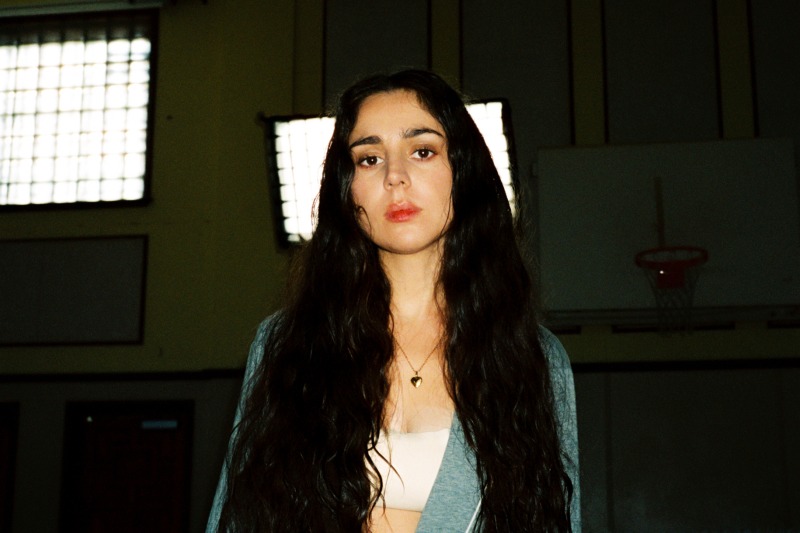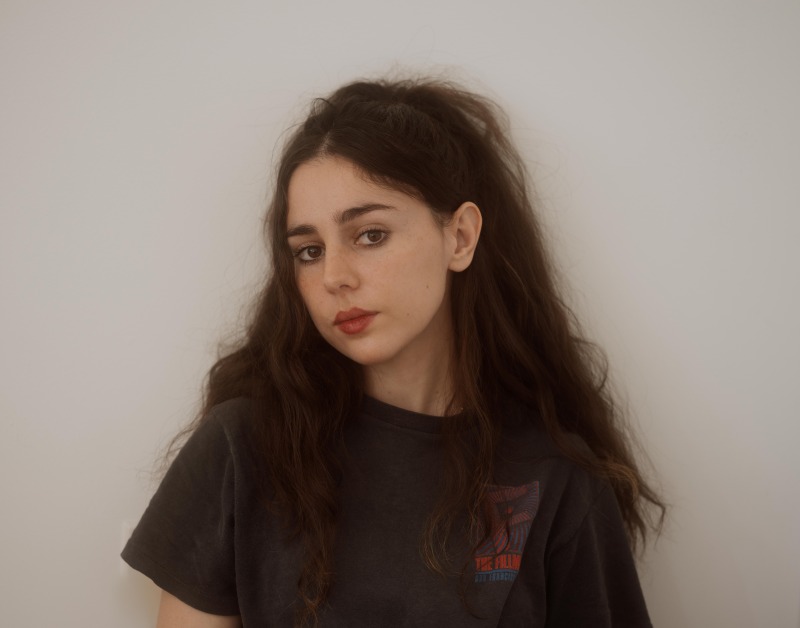COVER STORY | Samia is Impossible
In our latest Digital Cover Story, we catch up with the Minnesota singer-songwriter about accepting the reality of her personhood, drawing from Judith Butler, folk horror, and poetry, and her third album, Bloodless.
Photos by Graham Tolbert & Riley Dwyer
THERE’S SOMETHING ABOUT THE halcyon days early on in a relationship, when you and your paramour don’t know that much about each other, except that you want to spend all your time together. Around every corner is a mystery—What was their childhood like? Did they go to camp as a kid? Do they get along with their family? What were they like in college?—and those question marks keep us coming back for more. We’re curious creatures by nature. As a chronic oversharer, I was never able to keep the mystery alive for long with a new partner. I’m a heart-on-my-sleeve kind of gal from a family in which no one would think to utter the letters “TMI,” but I always envied those who were able to shroud themselves in ambiguity, existing as a bewitching enigma. Singer-songwriter Samia Finnerty (known mononymously as Samia—emphasis on the first syllable), on the other hand, finds that she’s kept people at arms’ length in relationships, “trying to be barely there so I could be bigger in this other way and giving as little of myself as possible, and then being sort of terrified of being actually known, because it limited my options.”
I first listened to Samia’s music about five years ago, when former Paste editor Steven Edelstone urged me to listen to her indie-rock single “Fit N Full.” Bouncing, sunny guitar and road trip-ready percussion lured me in with their bright catchiness, though underneath the anthemic trappings Samia skewered the empty promises of dieting culture (“Apple cider vinegar and kale / I’m fit and full as ever” and “Only getting hotter as I sweat”). When she released her debut album The Baby in 2020, on which “Fit N Full” appears, I distinctly remember being so bowled over by it that I had to start the record over the moment the final song ended. Part of the appeal was her songwriting—beyond the summery melodies, gently strummed guitar, and lucid pop sensibilities, her lyrics were both deeply evocative and cryptic. I was left with the same feeling that plagues me after a particularly affecting David Lynch film—there was rich meaning there that I didn’t fully get, which inevitably meant I wanted to go back for more.
Samia calls this writing style of hers “Rumpelstiltskin” because “it feels like a bridge troll is asking you to solve three riddles.” It’s an approach she largely abandoned on her 2023 sophomore record, Honey, which features a more straightforward, diaristic tack. For example, the lyrics of “Kill Her Freak Out” are arrestingly direct, voicing Samia’s worst impulses: “I’ve never felt so unworthy of loving / I hope you marry the girl from your hometown / And I’ll fucking kill her / And I’ll fucking freak out.” Gone was the read-between-the-lines wit of The Baby; Honey was about leaving everything on the table, even if it was thorny and hard to look at.
“I sort of used to have this idea that you have to give everything away in order to be a good, honest artist,” Samia tells me over Zoom. However, her new album Bloodless sees her returning to her sphinx-like ways while channeling the alt-country sound dominating indie music these days (she’s no bandwagoner, though—The Baby has some lovely country-tinged moments). “That’s how I started [writing] and how I made my first record, and I found a lot of solace in coming back to it. It just feels like the most cathartic way for me to write,” she says. Her lyrics often begin as poems, a medium she first fell in love with at age 12. “I had a really good teacher in the sixth grade who introduced me to all my favorite poets and songwriters, too, and the first person to be like, ‘You can do this. [Poetry] might be the thing that you have good instincts in.’ He totally changed my life.”
And, funnily enough, Samia’s abstruse lyrics again play into this notion of keeping her cards close to her chest in order to be the most enticing version of herself possible. “Sometimes writing in code can be a way to keep people out there and not have to fully reveal or be completely vulnerable, which I used to be sort of embarrassed about. But I think, especially around this album, I started to accept it and be excited about it,” she says, later elaborating: “I like it better this way. I can leave certain things up to interpretation and then keep the meanings for myself. And I don’t have to get on stage and absolutely spill my guts in the most direct possible way.”
In early 2023, Samia started writing the album that would later become Bloodless, with this notion that “it’s easier to be an idea than a person” as her conceptual “north star.” Notably, she doesn’t place a value judgment on the choice to exist more in someone else’s imagination than the actual. “The less you give away of your humanness, the bigger you can be in someone else’s mind. Your reality, your humanness, kind of shrinks your possibilities, and that can be both infuriating and also really empowering. [The album is] sort of grappling with the truth of that,” she shares.
On Bloodless’ second track “Bovine Excision,” Samia confesses “I wanna be untouchable” over honeyed acoustic guitar from longtime collaborator and Hippo Campus member Jake Luppen. As the song unfurls, the guitars growing more insistent, she doubles down on her desire to be someone whose being defies reality. “I wanna be impossible,” she sings, her lyrics later blooming in full gothic: “And drained, drained bloodless.” The Sarah Ritter-directed music video for “Bovine Excision” opens with with eerie night vision shots from the perspective of someone running in the woods, before switching to a relatively serene—but still ever-so-slightly unsettling—cabin in the South Carolina woods where Samia lounges, her surroundings ornamented with a deer skull and seashell wind chimes.
“We had just watched Blair Witch, and we were talking about this idea of oscillating between being the monster, the killer, the villain, and the final girl, which is something that I’d been thinking about in writing a lot, with this idea that the less you give of yourself, the more you can become,” Samia tells me. She’s only recently gotten into horror films—her favorite is Robert Eggers’ The VVitch—and this song (as well as the rest of the album) sends the spine tingling with its haunting atmosphere. As for the setting of the “Bovine Excision” video, the South Carolina swamp was something of a no-brainer for Samia: “I have this character called Kiki Swamp, I can’t even believe I’m talking about it, but I developed this character so that I could, like, not be embarrassed about writing about certain things, or writing with a certain tone, because she’s more confident than I am, and she lives in a swamp, so we had to get ourselves to the swamp.”

THE ALBUM ITSELF WAS RECORDED between Durham, North Carolina and Minneapolis, Minnesota, where Samia lives. “I’m pretty shy, so I only feel comfortable to really write with a very small group of people that I trust a lot, and they live between here and in Durham, North Carolina,” she explains. Caleb Wright, who co-produced Bloodless and The Baby with Luppen (as well as Honey with Rostam Batmanglij), is a Minneapolis native, but lives in Durham, while the rest of Samia’s creative co-conspirators are in the Midwest like her. When in North Carolina, she and her friends work out of Sylvan Esso’s recording studio Betty’s, which is suitably tucked away in the woods.
-

-

-

-

-

-

-

-

-

-

-

-

-

-

-

-

-

-

-

-

-

-

-

-

-

-

-

-

-

-

-

-

-

-

-

-

-

-

-

-









































